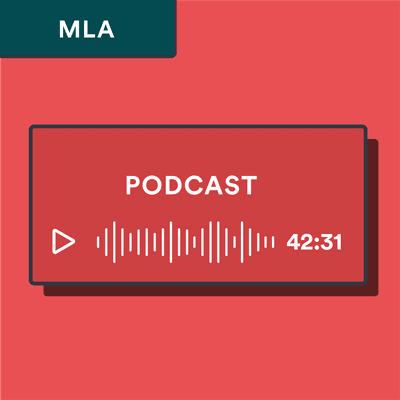How to cite a podcast in MLA

To cite a podcast in a reference entry in MLA style 9th edition include the following elements:
- Contributor(s) name, label: Give the last name and name as presented in the source (e. g. Watson, John) of the primary contributor(s). End with their contribution label preceded by a comma (e. g. Watson, John, director.). When given after the title give the label first followed by the name in normal order (e.g. directed by John Watson).
- Title of the podcast episode: Titles are italicized when independent. If part of a larger source add quotation marks and do not italize.
- Title of the podcast series: Container titles are italicized and followed by a comma.
- Production studio: If the name of an academic press contains the words University and Press, use UP e.g. Oxford UP instead of Oxford University Press. If the word "University" doesn't appear, spell out the Press e.g. MIT Press.
- Date of release: Give the day, month and year of publication. All months, excluding June and July, are abbreviated as three letters (e.g. 9 Aug. 2019.)
- URL: Copy URL in full from your browser, include http:// or https:// and do not list URLs created by shortening services.
Here is the basic format for a reference list entry of a podcast in MLA style 9th edition:
Contributor(s) name, label. "Title of the podcast episode." Title of the podcast series, Production studio, Date of release, URL.
Take a look at our works cited examples that demonstrate the MLA style guidelines in action:
A podcast series with one producer
Roy, Rohan Deb, producer. "Decolonise science: time to end another imperial era." In Depth, Out Loud, The Conversation, 27 June 2018, theconversation.com/decolonise-science-time-to-end-another-imperial-era-podcast-98909.
A podcast series with one speaker
Mars, Roman, speaker. "Sound and Health: Cities." 99% Invisible, 99pi, 16 May 2019, 99percentinvisible.org/episode/sound-and-health-cities/.
MLA in-text citation of a podcast
Audio-visual material uses the specific time of the audio/video for in-text citations.
(Last name time) or (Short form of title time).
A podcast series with one speaker
The description of how sound is related to health resonates with direct evidence (Mars 00:15:43-00:17:20).

This citation style guide is based on the MLA Handbook (9th edition).